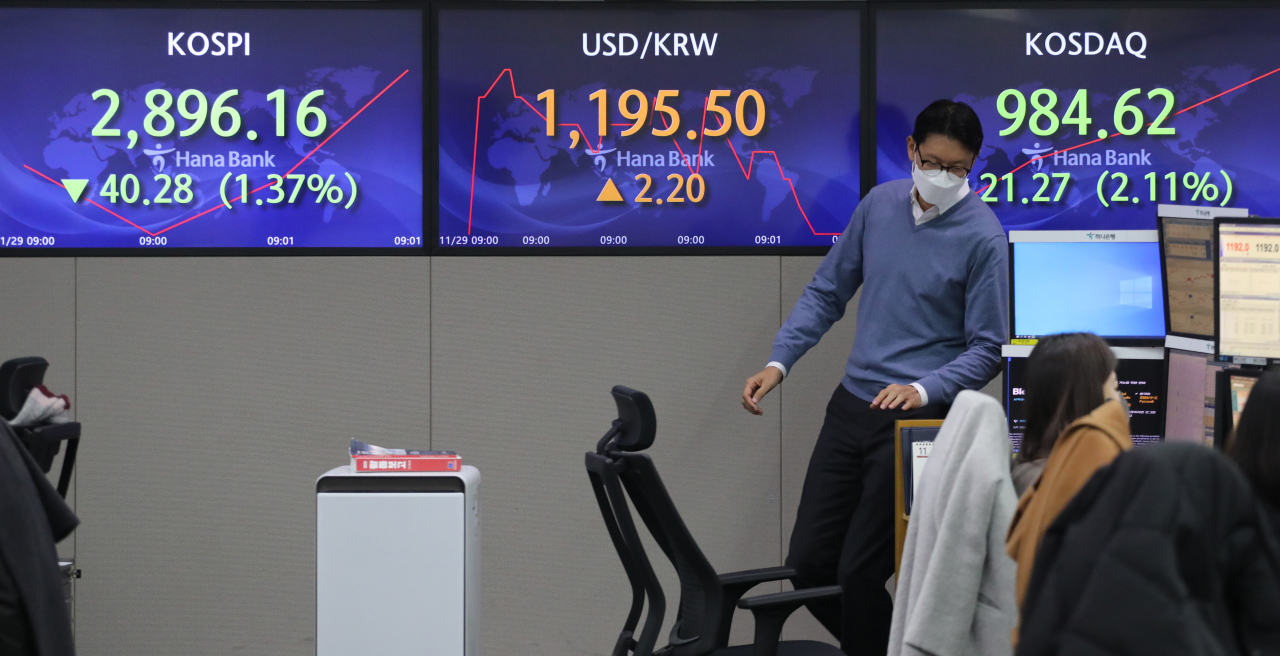 |
An electronic board at Hana Bank dealing room in central Seoul shows the Kospi trading at 2,896.16 around 9 a.m. on Monday. (Yonhap) |
South Korea’s vice finance minister said Monday that the government plans to keep close tabs on the financial market for possible volatilities and woes caused by the emergence of the omicron variant of the COVID-19 virus.
“There is a possibility that the volatilities in the global financial market could be expanded by the emergence of the omicron variant,” First Vice Finance Minister Lee Eog-won said at a macroeconomic meeting of government officials and the private sector.
“We will kick off round-the-clock monitoring of the global and local financial markets while checking the impacts of the variant on the economy,” he added.
Korea will start implementing tougher entry rules for arrivals from eight African nations starting this week to combat a potentially more contagious variant of the coronavirus first identified in South Africa and Botswana. The World Health Organization declared omicron to be “of concern” on Friday.
“The volatilities prompted by the variant include plummeting local and global stocks, rising Korean won against the US dollar and falling interest rates and oil prices,” Lee said.
Lee explained that the growing risk-avoidance tendencies and dampened investor sentiment observed in the global market amid the emergence of the new variant were affecting the local market as well.
The nation’s benchmark Kospi on Monday opened 0.8 percent lower from the previous closing at 2,912.93. It fell below the 2,900-point mark at one point for the first time since Jan. 4.
Experts said that due to the emergence of omicron, the US Federal Reserve is likely to delay the timeline for its monetary policy normalization, which could be a double-edged sword for the market and investors.
“The omicron variant has increased volatilities across the financial market concerning how it could affect the timeline of the US monetary policy normalization,” said Seo Sang-young, an analyst at Mirae Asset Securities.
“While the volatility from the variant could be a short-term risk, it could deal a further blow to the global supply bottleneck when it rattles the ASEAN and Chinese market,” he added.
No Dong-gil, a researcher at Shinhan Investment, said, “The US Fed was likely to accelerate tapering of its bond purchases at the meeting of the Federal Open Market Committee in December, but the new variant will likely work as a hurdle to its initial plan.” No added that investors had already delayed the timeline for a rate hike by the US Fed, which was expected to happen at least once by end-June next year.
Meanwhile, in a bid to quell the growing inflationary pressure and snowballing household debt, the Bank of Korea last week carried out its second pandemic-era rate hike, raising its benchmark interest rate by 25 basis points to 1 percent. It had ended more than a year of ultralow interest rates in August, raising the rate from a record-low 0.5 percent to 0.75 percent.
By Jung Min-kyung (
mkjung@heraldcorp.com)








